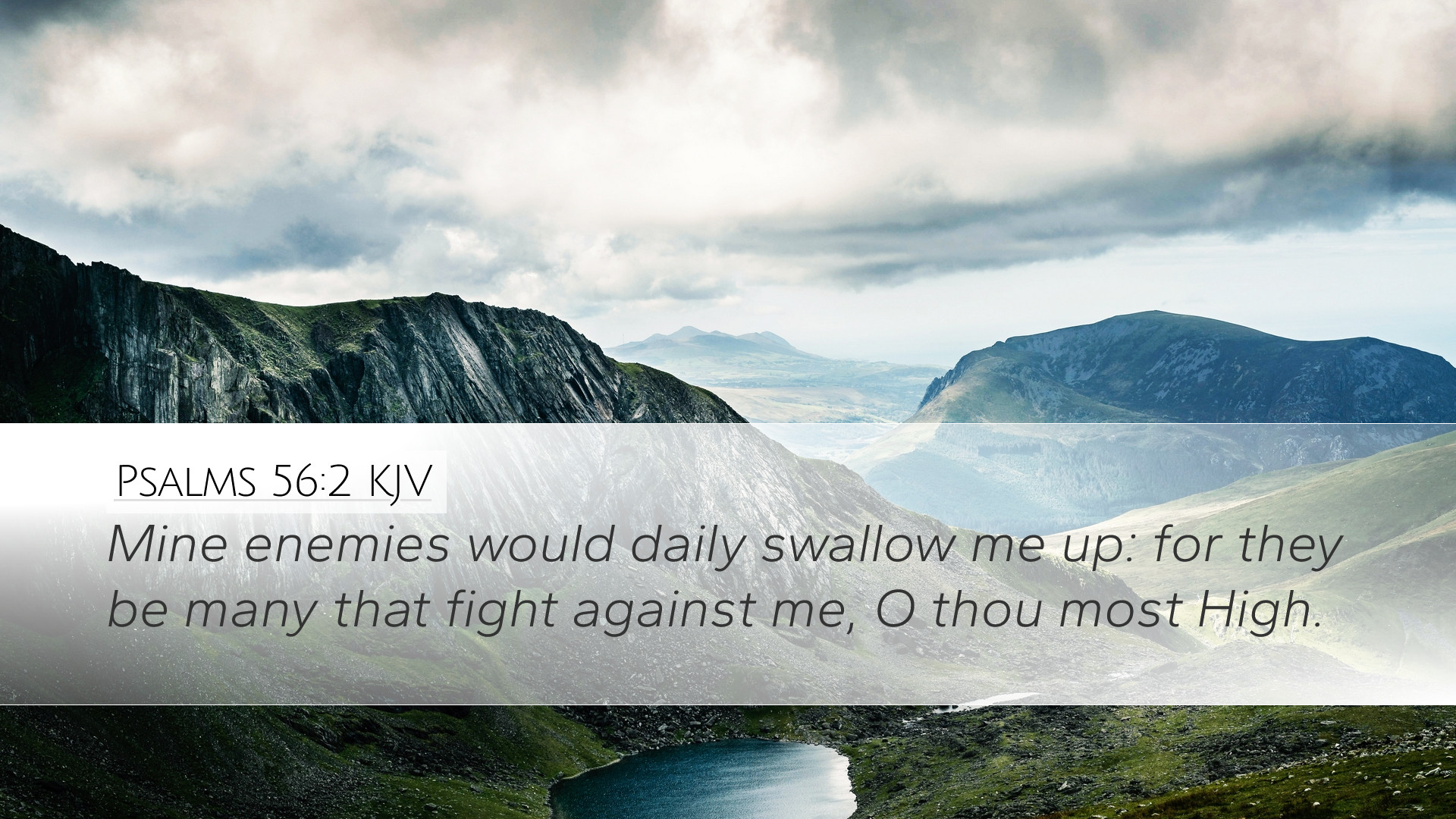Psalms 56:2 - Commentary and Insights
Bible Verse: Psalms 56:2 - "Mine enemies would daily swallow me up: for they be many that fight against me, O thou most High."
Introduction
This verse from the Book of Psalms encapsulates deep sentiments of fear, desperation, and the cry for divine intervention amidst overwhelming adversity. The spiritual and theological implications of this verse resonate with many believers, especially as it touches on the themes of faith under duress and the recognition of God as the ultimate source of refuge.
Contextual Analysis
The context of Psalm 56 reveals that it is attributed to David when he was captured by the Philistines at Gath. His lament reflects not only his physical peril but also his emotional and spiritual turmoil. This highlights the reality of being pursued by enemies, which is a common experience among the righteous.
Insights from Biblical Scholars
Matthew Henry's Commentary
Matthew Henry emphasizes the dire circumstances David finds himself in, noting that his enemies' intentions are to "swallow him up," symbolizing complete destruction. He argues that David’s expression of fear is both a natural human response and a reflection of his faith. Henry notes:
- The Nature of Enemies: Henry explains that the enemies mentioned are not merely physical adversaries but represent spiritual opposition as well. This duality reminds believers of the constant spiritual warfare.
- Certainty of Conflict: The phrase "daily swallow me up" signifies a relentless and persistent attack. This serves as a reminder that believers may often feel besieged by troubles that appear unending.
- Call to the Most High: David’s invocation of "O thou most High" illustrates a crucial reliance on God. Henry posits that amidst overwhelming fear, calling upon God is the believer's greatest strength.
Albert Barnes' Insights
Albert Barnes provides a thorough analysis that focuses on the trust and confidence a believer ought to maintain even in the face of adversity.
- The Power of God: Barnes highlights the affirmation of God's sovereignty in the phrase "O thou most High." Despite the multitude of enemies, affirming God's position reminds the faithful that no adversary is outside His control.
- Daily Struggles: He interprets the "daily" aspect as a reflection of the ongoing struggles of life. Christians must recognize these daily battles and face them through prayer and reliance on God’s strength.
- The Role of Fear: Barnes encourages a practical engagement with fear, suggesting that while fear is a natural feeling, it should lead us back to faith. The acknowledgment of enemies should propel the believer to seek divine protection and strength.
Adam Clarke's Perspective
Adam Clarke provides a more exegetical approach, delving into the original language and the implications of the text.
- Language and Meaning: Clarke notes that the term for enemies refers to both physical men and spiritual foes, emphasizing the comprehensive nature of the battles believers face.
- Emotion and Theology: Clarke asserts that David’s emotional state is legitimate and expected for someone in distress. Recognizing this emotional transparency is vital for pastoral care and counseling.
- Reliance on Divine Deliverance: He stresses that this verse is not simply a lament but a profound declaration of reliance on God to deliver from the hands of the many adversaries.
Theological Implications
Throughout the commentaries, several theological implications emerge that are vital for modern readers:
- The Nature of God: God is recognized as "most High," affirming His ultimate authority over all situations, including the trials believers face.
- Human Vulnerability: The acknowledgment of fear and enemies shows the believer's vulnerability, which is an integral part of the journey of faith.
- Faith in Adversity: Responding to fear with faith, prayer, and reliance on God’s promises is a recurrent theme that provides hope and encouragement to those walking through difficult seasons.
Practical Applications for Today
As pastors, students, and scholars examine Psalms 56:2, several practical applications arise:
- Encouragement in Trials: Encourage congregants to bring their enemies and fears to God in prayer, reminding them of His protective power.
- Discipleship on Spiritual Warfare: Educate believers on the reality of spiritual warfare, grounding them in Scripture to prepare them for overcoming life’s adversities.
- Emotional Honesty: Promote environments within congregations where emotional honesty is valued, reflecting David’s openness in expressing fear and need for divine help.
Conclusion
Psalms 56:2 resonates deeply with all who face trials and opposition. The combination of David’s fervent plea for help and his unwavering trust in God's sovereignty serves as a profound source of comfort and challenge. Encouraging believers to continually rely on God, especially in the face of overwhelming odds, remains a timeless truth. As highlighted in the insights offered by Henry, Barnes, and Clarke, this passage invites a reflection on both the nature of our adversities and the greatness of the One to whom we cry for help.


